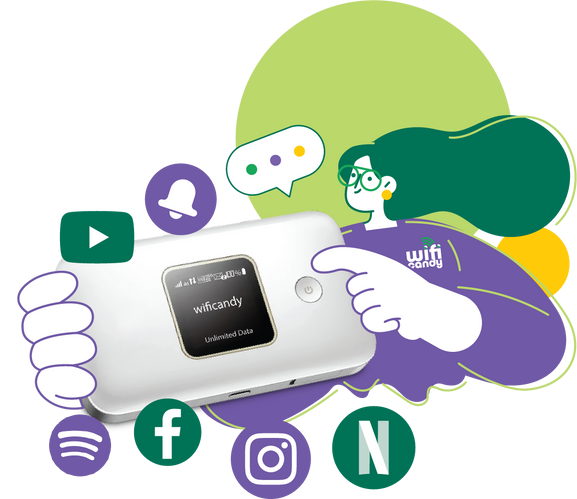COVID-19 PRECAUTIONS
_ _ _ _ _ _ _ _ _ _ _ _ _ _ _ _ _ _
Due to the nature of this current situation for customers who wish to cancel their existing orders please get in touch with us ASAP: hello.wificandy@gmail.com
*Meanwhile please consider to postpone your order later this year if possible. We can reschedule it for you!
_ _ _ _ _ _ _ _ _ _ _._ _ _ _ _ _ _
It is without doubt that the current social climate is impacting every individual and business worldwide. Although this impediment has caused huge disruptions already, especially in the travel sector, let's stay positive and do our best to remain calm!
According to World Economic Forum, "As COVID-19 coronavirus continues to spread across the world, it's important to consider the number of recoveries from the disease, of which there have been almost 66,000. On 10 of March, China reported just 40 new cases, the lowest figure since it began disclosing numbers"

Below we summarised some useful information released by the Irish Health Service Executive (HSE) Body, the World Health Organisation(WHO) and Stanford Hospital Board.
According to the HSE, Ireland is currently in the containment phase of the response. This means we are taking actions to prevent or limit the spread of coronavirus. This is the same as all countries across Europe.
The risk of catching coronavirus in Ireland is still low to moderate. This may change. However, most people may continue to go to work, school and other public places, as usual.
How coronavirus is spread
Coronavirus is spread in sneeze or cough droplets.
You could get the virus if you:
- come into close contact with someone who has the virus and is coughing or sneezing
- touch surfaces that someone who has the virus has coughed or sneezed on
As it's a new illness, we do not know how easily the virus spreads from person to person. Spread is most likely from those who have symptoms.
The virus may only survive a few hours if someone who has it coughs or sneezes on a surface. Simple household disinfectants can kill the virus on surfaces. Clean the surface first and then use a disinfectant.
Close contact
This is only a guide but close contact can mean:
- spending more than 15 minutes face-to-face contact within 2 metres of an infected person
- living in the same house or shared accommodation as an infected person
Anyone with symptoms of coronavirus who has been in close contact with a confirmed case in the last 14 days should:
- isolate themselves from other people - this means going into a different, well-ventilated room alone, with a phone
- phone their GP, or emergency department
- in a medical emergency (if you have severe symptoms) phone 112 or 999
How to prevent
Below is some useful guidance provided by the WTO, their website offers more detailed info if needed:
- Frequently and thoroughly clean hands with an alcohol-based hand sanitizer or soap and water.
- When coughing and sneezing cover mouth and nose with flexed elbow or tissue – throw tissue away immediately and wash hands.
- Avoid touching your eyes, nose or mouth
- Avoid close contact with anyone who has a fever or cough
- Avoid greetings that include physical contact e.g. handshakes.
Additional Information to be considered from Stanford Hospital Board
How can one know if he/she is infected?
By the time they have fever and/or cough and go to the hospital, the lung is usually 50% Fibrosis and it's too late. Taiwan experts provide a simple self-check that we can do every morning. Take a deep breath and hold your breath for more than 10 seconds. If you complete it successfully without coughing, without discomfort, stiffness or tightness, etc., it proves there is no Fibrosis in the lungs, basically indicates no infection. In critical time, please self-check every morning in an environment with clean air.
Serious excellent advice by Japanese doctors treating COVID-19 cases: Everyone should ensure your mouth & throat are moist, never dry. Take a few sips of water every 15 minutes at least.
Why? Even if the virus gets into your mouth, drinking water or other liquids will wash them down through your throat and into the stomach. Once there, your stomach acid will kill all the virus. If you don't drink enough water more regularly, the virus can enter your windpipe and into the lungs. That's very dangerous.
Please send and share this with family and friends.





